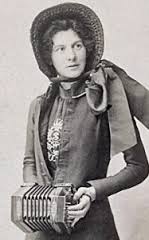“The majority in the world are sinners, and are quite against goodness, and I’m afraid it’s the same in Torquay”, Evangeline Booth
“Ten pounds to the man who will quiet her”, a Torquay hotel proprietor
During 1888 Torquay experienced a sustained challenge to established authority. This became known as the Torquay War and, bizarrely, followed the arrival in town of the Salvation Army.
The Salvation Army is an evangelical Christian Church, founded in London’s East End in 1865 by William and Catherine Booth. It was modelled after the military, with its own flag and its own music, often using Christian words to the popular tunes sung in pubs.
Torquay became a focus for Salvationist activity due to the town’s prohibition of processions accompanied by music on Sundays. In January 1888 Torquay’s police charged a Salvation Army band with infringing these regulations. The Corps Commander, the bandmaster and several bandsmen were fined, but refused to pay and were subsequently jailed. The bandsmen refused to give up the right to play and on February 3, eleven more were summonsed for the same offence.
A pattern then emerged. The bandsmen played every Sunday, and were then summonsed and often jailed. A regular Torquay event became the musical procession that accompanied prisoners being taken to Exeter prison, and then to welcome them on their return.
Over 100 Salvation Army members were eventually prosecuted and regularly imprisoned. In response, local sympathisers formed a bodyguard to protect the Salvationists from the police and from hostile residents. Over the months, the Army was reinforced by bandsmen from Exeter, Newton Abbot, Crediton, Barnstaple and Ilfracombe. In a cat-and-mouse game, the police responded with surveillance, infiltration, intimidation, and – according to reports – the occasional violent assault. Meanwhile, taking advantage of the confusion, young men engaged in “rowdyism and riot”.
Enter William and Catherine Booth’s young daughter, the irrepressible Evangeline Cory Booth (1865-1950).
At 15 years of age Evangeline (pictured) was a sergeant selling the Army’s paper ‘The War Cry’ in the slums of east London. In 1887, she became the officer of the corps in Marylebone, where there was very strong opposition to the Salvation Army. Wherever trouble threatened, William Booth’s solution was, “Send Eva!”
Evangeline was 23 when she came to town. She pronounced, “The majority in the world are sinners, and are quite against goodness, and I’m afraid it’s the same in Torquay.” She quickly organised the campaign and launched her legal defence and version of street activism from the Army’s ‘Fort’ in the back street which runs parallel to Union Street, behind today’s MacDonald’s. The area was then known for pubs and beer houses. Aspiring to virtue expected of God-fearing Christians, the the road had acquired the name of Temperance Street – which is perhaps a real irony to those of us who know the area for the Hop & Grapes (or the Hope & Grope if you’re a local), the White Hart and the long-gone Hideaway Club!
Out of Torquay’s population of 20,000 at the time, only 229 were Salvationists. However, Evangeline’s high profile ensured that the bands illicit appearances attracted thousands of sympathisers who were prepared to defend the Army as it marched. To give an idea of the nature of the increasingly acrimonious and often violent conflict, here are a few reports of events:
“A great crowd gathered at Market Street, waiting for the prisoners to be taken to the railway station. The Royal Hotel bus was hired, and the prisoners were placed in it in charge of four constables. The progress of the vehicle was greatly obstructed while proceeding down Market Street, and on turning the corner it was nearly overturned. The confusion was so great that many people, including two constables were thrown to the ground, and the bus passed over the leg of PC Cole…”
“At Market Corner, a posse of police marching as if for duty broke into units and, led by a sergeant, fell foul of the procession… The band marched ahead and reached the Fort. The other Salvationists were included in a riot, some of the ‘lassies’ losing their tambourines…”
“With considerable tenacity the women held on to the flag… a cab man tried to lash his horse through the Salvationists and blows were exchanged…”
The ‘Torquay War’, as it was known, carried on for six months before the Salvationists won and the law was changed.
Some see the whole episode as just an insignificant case of religious fundamentalists clashing with long-established local rules. However, note the following from ‘The War Cry’ of 1888:
“The class at Torquay amid which, and for which, the Salvation Army works, seems to have grasped that it is fighting the battle of the masses… on the other side are ranged the local ‘society’ – black-hatted respectability, practical Toryism, the Army’s ‘betters’ generally – everything that cries ‘hush’ when one asks for a law to prevent wrong.”
It’s worth noting that the Salvation Army’s main converts were at first alcoholics, morphine addicts, prostitutes and others unwelcome in polite Christian society. In contrast, Booth’s Army saw itself as the friend of the ‘dangerous classes’, and many conservatives were wary of anyone organising the poor into a movement, let alone an ‘Army’.
The Army’s Foundation Deed also stated that women had the same rights to preach as men – Catherine Booth acted as a religious minister, which was unusual at the time. Consequently, women had a high profile in the Army. Salvationists accordingly alarmed Victorian society and Torquay’s elite were understandably hostile to their arrival. For example, in a discussion about the activities of Evangeline, one un-named Torquay hotel proprietor was quoted as offering, “Ten pounds to the man who will quiet her.”
It may also be significant that in one Market Street incident we find it reported that, “Roughs brought in from the neighbourhood, and led by two policemen, attacked the band”.
Indeed, Salvationists across England were experiencing intense verbal and violent assaults at this time. Their campaigns against drink, tobacco, gambling, boxing, music halls and other social evils – the pleasures of the working class – generated great hostility. Their opponents were grouped under the name of the ‘Skeleton Army’. This was a 4,000 strong organisation which disrupted Salvation Army meetings and gatherings, with tactics such as throwing rocks, bones, rats, and tar as well as physical assaults. Some of these attacks were led by publicans who were losing business.
Indeed, clashes between the two groups led to the deaths of several Salvationists and injuries to many others across Britain. In 1889 alone, at least 669 Salvation Army members were assaulted, including a surprisingly large number of women: 251.
We don’t know whether the civilians who attacked the bands in Torquay saw themselves as members of the Skeleton Army, were vigilantes employed by vested interests, or just locals angered at the intrusion of outsiders interfering with their daily pleasures. The ‘riots’ were, however, far more than just a local disagreement about the right to bang a tambourine on a Sunday.





























